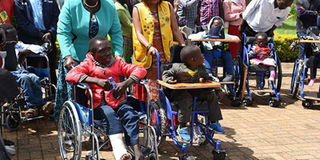Stand up for the disabled, it’s time to honour them

Turbo MP Janet Sitienei (left) and Lions Club of Eldoret President Lina Shah distribute wheelchairs to children with disabilities at Lions School, Uasin Gishu County, on June 24, 2018. PHOTO | FILE | NATION MEDIA GROUP
What you need to know:
- We can begin by acknowledging disability is a reality. One way to do this is by accepting the disabled persons in our own homes.
- We should create economic opportunities for them by educating them and enabling access to all mainstream systems and services.
To read that some people in Tharaka Nithi were tethering their disabled relatives was heartbreaking.
It was not that they were not aware it was wrong, they seemed to have no other option. They had been rejected by their schools and society.
Tethering was a way to keep them safe while they were out looking for sustenance. They also had to be on the lookout for them lest they fall prey to sexual predators.
Can you imagine going about your day, praying and hoping you’ll find your shackled relative alive and well?
According to the World Health Organization (WHO), about one billion people - 15 percent of the world’s population - have a disability.
Of this, 80 percent live in developing countries, specifically in rural areas.
CULTURE
This statistic by itself should be a reason each one of us should be a champion for disabled people. It also shows where our hearts are in regard to communing with them. We prefer to “hide” them in the rural areas away from the public’s prying eyes.
The story of the matatu driver who personally ensured his disabled passenger got to work and back home safe and sound, though very noble, shouldn’t have made news and neither should have been the news that Goldalyn Kadiya, who has albinism, had emerged top in KCSE.
These are occurrences that should have been normalised a long time ago. For a very long time, disability has been seen as a bad omen in African communities.
Not even the coming of Christianity or science has been able to turn this view around.
Though the country has taken tremendous strides, disabled people are still suffering and are looking for opportunities to be seen and heard.
HANDOUTS
Take a walk in the CBD and you will see them seated in strategic places where they can appeal to the masses with their begging bowls.
Some organisations have daylong CSR activities that involve disabled people. While giving the coins, donating basic necessities and engaging them is great, is this all there is to their lives?
Is this the best that we can do as a society to enable them to live normal lives?
When was the last time you saw a disabled person in a wheelchair, wheeling themselves around the CBD or doing grocery shopping alone?
Wouldn’t it be wonderful to see persons with disability going around living life, enjoying nature walks, using public transport or even laughing together with their able-bodied counterparts on a daily basis?
Wouldn’t it be wonderful if they were among the “Top 40 under 40” or the richest individuals in Kenya - especially because disability and poverty are intricately linked? This should be our dream.
EMPATHY
Ms Lupita Nyong’o said all dreams are valid. But dreams require work to come true and there is much that we can do.
We can begin by acknowledging disability is a reality. One way to do this is by accepting the disabled persons in our own homes.
Hiding them does nothing but add to their physical and emotional torment. We can also volunteer at or visit disabled people’s homes.
By doing so, we allow ourselves to interact with their truth, walk in their shoes and only then can we begin to find solutions to the challenges they face.
Two, we should create economic opportunities for them by educating them and enabling access to all mainstream systems and services.
Simon Wanjeru, a retired blind teacher, taught for almost 40 years!
He was able to build a life for himself and impact hundreds of students and it all began with an education and a willing employer.
POLICY
Three, we should plan for disability through proper data collections to inform laws and policies. If a disabled person wanted to go to town, it would be a nightmare.
Four, we should set up a Disability Fund where everyone contributes to their well-being. Disability is a burden that should be borne by all especially because it could have easily been either of us in that position. None of us is immune from disability.
People with disabilities count. There is more to them than a shunned life. They have aspirations and futures, and can contribute greatly to our society. Let us make room for them.
Ms Wanjohi is the founder, Mazingira Safi Initiative. [email protected]





